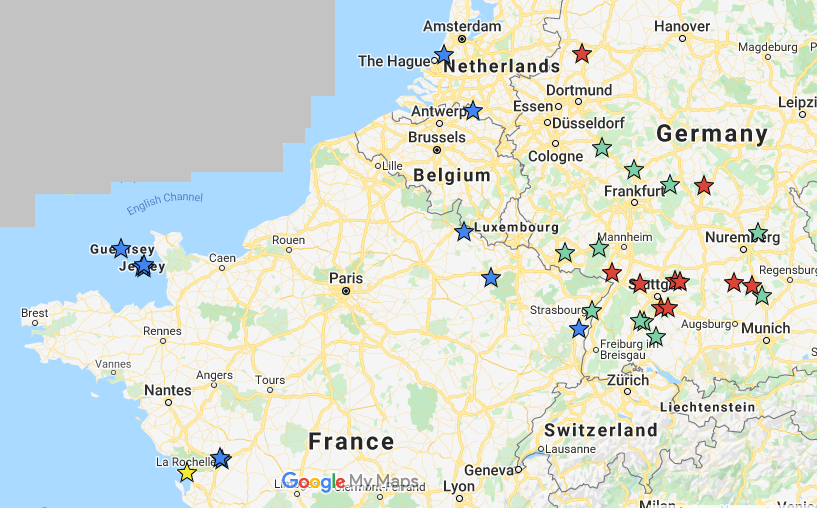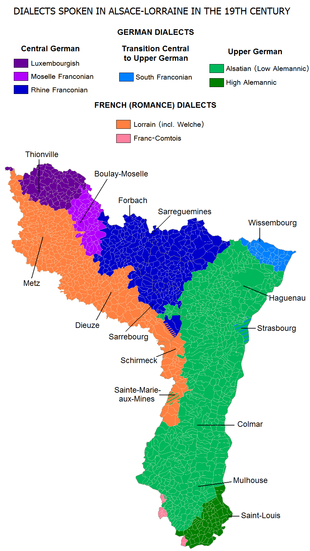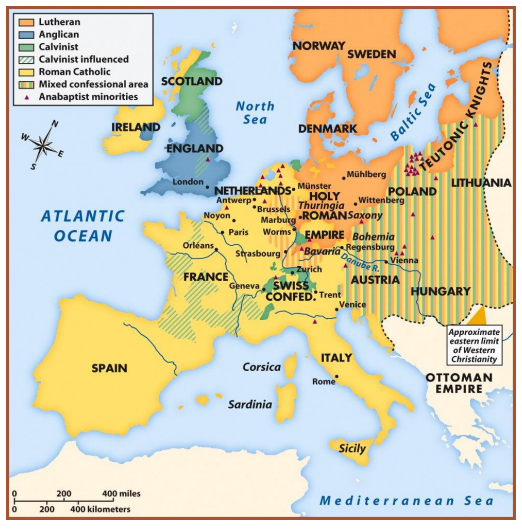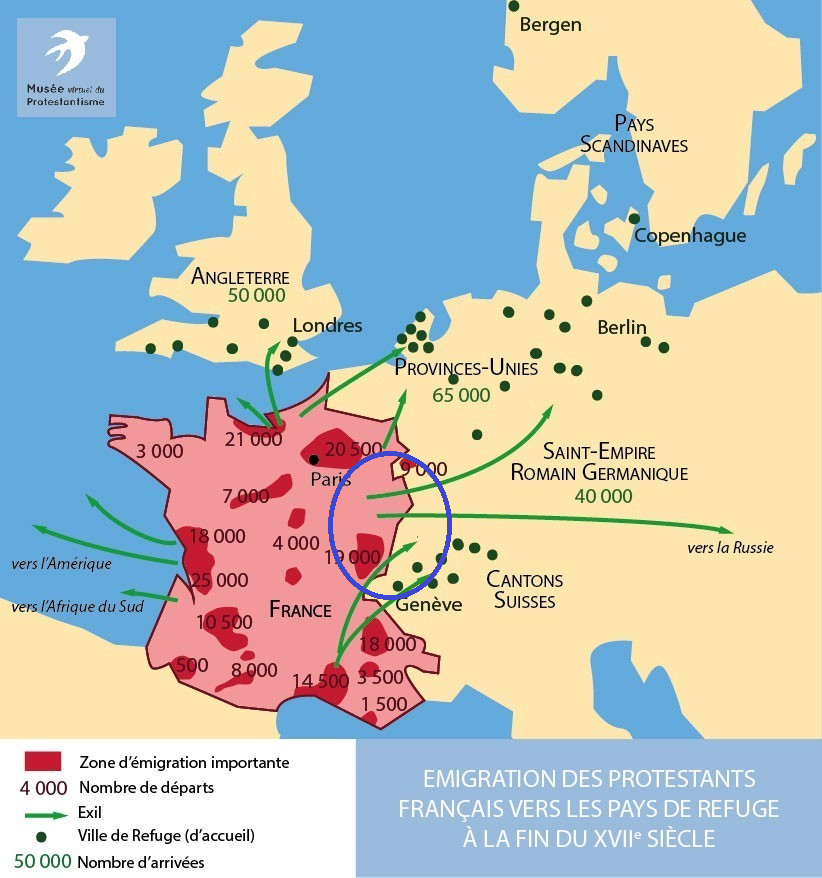As part of the search for the origins of my Newell ancestors I reviewed Ancestry DNA matches for myself, my sister and two cousins (with a common Newell ancestor) to people with UK and European ancestors having Newell, Noel and related surnames (see the section of this site on DNA Matches to the Old World). The following Map shows locations in Continental Europe with matches (note: several of these locations have multiple matches).

This Map shows a cluster of DNA matches along the course of the Rhine River between Amsterdam and the Black Forest. West of the Rhine these are associated with the Noel surname while east of the Rhine they are associated with the Noll and Knoll surnames. There are two other clusters, one near La Rochelle on the Atlantic coast which has Noel and Canol (see more below) and one with the Noel surname in the Channel Islands (part of the UK but included here due to its links to France).
The Noel surname name is from Middle English, Old French no(u)el ‘Christmas’ (Latin natalis (dies) ‘birthday’). The name occurs in both France and England and I get English DNA matches to this name. The cluster of Noels west of the Rhine on the Map is in the Alsace Lorraine region of France. Historically, the area was at the centre of Charlemagne’s Frankish empire in the 9th century and later became part of the Germanys of the Holy Roman Empire, remaining a German territory under various sovereignties up to the Thirty Years’ War. The Peace of Westphalia (1648) concluding that war gave control of Alsace-Lorraine to France. Subsequently, this part of France switched between France and Germany several times but in the mid 19th century much of Alsace Lorraine was occipied by German speeking people (see Map below).

The Noel matches in the area of Poitou, France are linked to Noels who emigrated to Quebec in the 17th century and the matches in the Netherlands link to migrants, likely from France, who emigrated to America in the 17th century. The Noel matches to the Channel Islands are a more mixed group but may represent migrants from France who moved there.
The surnames Noll and Knoll are both linked to the Middle High German word nol which is a ‘hillock’, or ‘knoll’.
One other group of names names possibly associated with a hill in early English records include the names Cnoll, Canol, Cnolle, Canoll. In Middle English knolle is a ‘hilltop’, ‘hillock’ and in Middle High German knol is a hill or ‘peak’; however, in Old English is the word for hill is cnoll (Old English cnoll “hilltop, small hill, clod, ball,” related to Old Norse knollr “hilltop;” German knolle “clod, lump;” Dutch knol “turnip,” nol “a hill.” https://www.dictionary.com/browse/knoller ).
Cnoll, Cnolle, Canol and Canoll occurs as names in early Norman records for different areas of England. Note: The sound of the French letter “C will change depending on if it is followed by a hard or a soft vowel: soft pronunciation – In front of an ‘E,’ ‘I,’ or ‘Y,’ the ‘C’ is pronounced like an ‘S’ ; hard pronunciation – In front of an ‘A,’ ‘O,’ ‘U,’ or a consonant, ‘C’ is pronounced like a ‘K’ https://www.thoughtco.com/french-pronunciation-of-c-1369549 . Thus cnoll (old English for hill) when used as a name would be pronounce like Knoll.
The English publication The Parliament Writs list a number of references to individuals with the Cnolle name in the 1300s (see below):

The Oxford Dictionary of Family Names in Britain and Ireland list Cnolle as an early version of Knowles. Sir Robert Knowles a noted English mercenary fighting in Brittany and France in the 1300s was referred to as Sir Robert Canolles or Canole by French writers. A family Web Site for the Knell / Knill family names ( http://knightlyfamilies.com/intro1.htm ) has several comments sections (1 &3) that demonstrate that Cnoll, Cnolle were linked to the Knell families in England and that in the immediate centuries following the invasion these names were used interchangeably with Knell, Knill, Knolles, Knowles. By the fifteenth century in England the names Cnoll, Cnolle, Canol and Canoll were superseded by Knoll, Knolle, Knowles, etc.. In France there are historical records of the name dating from the 1600 mainly in the Charente-Maritime region (Rochelle) but virtually no modern references (see https://en.geneanet.org/ ). Many of the historical French records link to individuals that subsequently emigrated to the French colony of Acadia (now Nova Scotia).
There were DNA match to the Canol name, with all four “Dock Newells” investigated having matches and all but one having multiple matches. However, all of these matches had the same individual in their tree.
Marie Anne De Canol, BIRTH 1651 • St Martin De Re, La Rochelle, Charente Maritime, France DEATH 1693 • Pisquid, Minas Basin, Acadia, Canada.
All the links to Canol were linked to Marie Anne and her husband Jean Doiron; however, there were even more links to the Doiron name; perhaps linked to the 7 children they had in Port Royal, Acadia (now Nova Scotia). one of these children was Noel Doiron (c 1684 – 1758) who was referred to as the “father” to all the Acadians on Ile St. Jean (present-day PEI ) and was the namesake of the village Noel, Nova Scotia . This connection is explored in the section on Acadian Links.
Emigration from France
Significant numbers of emigrants left France during the following periods:
- 1538 to 1685: Protestants flee religious persecutions in France.
- 1632 to 1713: French settle Quebec and Acadia (Canada).
- 1722: Alsatian colonies established in the Holy Roman Empire (Austria-Hungary).
- 1764 to 1786: Alsatians colonize Russia, Ukraine, and Banat.
- 1785: Some exiled Acadians shipped from France to Louisiana.
- 1789 to 1791: About 500,000 refugees flee the French Revolution for neighboring nations and the Americas. About half later returned (source).
Apart from the French settlement of Quebec and Acadia most French emigrants were leaving France for religious reasons. At the start of the 16th century most of Europe was Roman Catholic; however, as the Reformation took hold in Europe during the 16th century two branches of the new Protestant Religion attracted followers. In the more eastern parts of the former Holy Roman Empire (what is now Germany) Lutheran theology became dominant while in France Calvinist theology (followers of theologian John Calvin) took hold in selected areas of what was still a predominantly Roman Catholic country.

French Calvinist, also known as Huguenots, were persecuted by the French Catholic government during the French Wars of Religion which were a prolonged period of war and popular unrest between 1562 and 1598. It is estimated that three million people perished in this period from violence, famine, or disease in what is considered the second deadliest religious war in European history (surpassed only by the Thirty Years’ War ). As a result of the religious persecution Huguenots fled France in the 17th century, creating Huguenot settlements all over Europe, in the United States and Africa.
Lutherans were a minority among the overall French Protestants and were most common in the areas bordering the Rhine. However, with the French conquest of German-speaking regions along the Rhine following the Thirty Years’ War (1618-1648) France acquired significant Lutheran populations. Many of these Lutherans migrated to the German States or other areas.
The core of my distant Ancestry DNA matches (outlined in blue on following Map) falls into areas that were more Lutheran than Huguenot; however, areas with clusters of matches along the Atlantic coast are classic Huguenot areas. The clusters along the Atlantic are

Noule, Noüel, Nouël
Another option for a French version of my family name (Newell, Noel) is Noule, Noüel, Nouël. In Europe (2014) data) this name is most common in France 486 individuals , Spain 15, Netherlands 13, Belgium 11 and England 4 (https://forebears.io/surnames/nouel).
In France it is most common in Pays-de-la-Loire region (see Map below).

Historically this name is also found in the Channel Islands where it is sometimes confused with Noel. See Nicolas Nouel (b c 1640) who was married on 7 September 1676 at St. Martin, Jersey, Channel Islands.
Some early references to this name in France include:
- Nouel (de) (Noüel), extraction 1535, protestation de la noblesse de Bretagne de janvier 1789LM 81, Bretagne, ANF-2010146.
- Nouël de Buzonnières, – de Tourville de Buzonnière, trésorier d’Orléans 1735, OrléanaisJougla 50 [Oeleans Loiret]
(Source: https://fr.wikipedia.org/wiki/Liste_des_familles_subsistantes_de_la_noblesse_fran)
This name also has connections to Quebec in the 1600s.
LISTE DES ENGAGÉS POUR LE CANADA 10 avril 1644— Jean NOUEL, laboureur, de La Rochelle